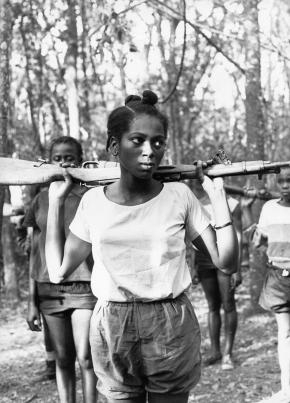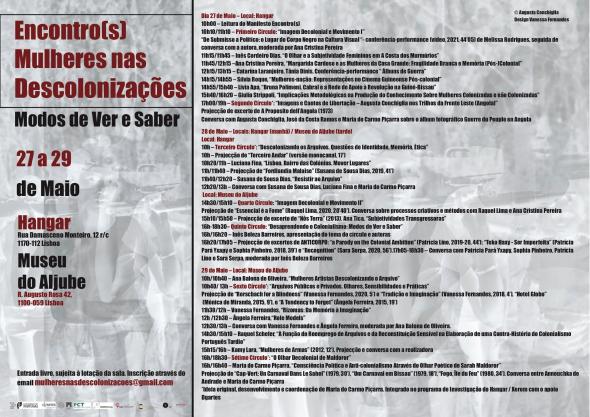Gathering(s) Gendering Decolonizations: Ways of Seeing and Knowing
In the context of the internationalism that was the backbone of liberation struggles worldwide, women used images – mostly photography and film – as a weapon. In a certain way, this political engaged praxis was a sort of response to the use of images by political, scientific, and economic propaganda, which very much sustained the colonial order and ideology.
 © Augusta Conchiglia (Angola, 1968)In Portuguese-speaking countries, among the women who photographed or made films for political purposes, the names of Augusta Conchiglia, Margaret Dickinson, Ingela Romare, Sarah Maldoror and Suzanne Lipinska stand out. The filmed materials – and not just the ones women authored – were given meaning by film editors Jacqueline Meppiel, Cristiana Tullio-Altan or Josefina Crato (the only woman among the four young Guineans sent, by Amílcar Cabral himself, to Cuba to study cinema).
© Augusta Conchiglia (Angola, 1968)In Portuguese-speaking countries, among the women who photographed or made films for political purposes, the names of Augusta Conchiglia, Margaret Dickinson, Ingela Romare, Sarah Maldoror and Suzanne Lipinska stand out. The filmed materials – and not just the ones women authored – were given meaning by film editors Jacqueline Meppiel, Cristiana Tullio-Altan or Josefina Crato (the only woman among the four young Guineans sent, by Amílcar Cabral himself, to Cuba to study cinema).
Margarida Cardoso, Pocas Pascoal, Maria João Ganga, Isabel Noronha through their cinematographic fictions; Kamy Lara, Ana Tica, Diana Andringa and Catarina Laranjeiro, through their documentary films; Eurídice Kala, Vanessa Fernandes, Filipa César, Mónica de Miranda, Ângela Ferreira, Luciana Fina, Jota Mombaça and Grada Kilomba through their projects, installations, performances and visual art works, make decisive contributions that reflect on (post-)colonial memories and experiences, ways of decolonizing the archive and re-imagine Portuguese colonialism and the struggle against it.
No history of decolonization or of decolonizing praxes is ever completed without attention to gender. How did women view the liberation struggles in the former Portuguese colonies? How were their ways of seeing integrated or not in the imagination of colonialism? Was there a specific gaze to women over the liberation struggles? What knowledge and awareness do we have of/about these ways of seeing? And how do these ways of seeing intersect with those of contemporary filmmakers, artists, curators and academics who are now questioning public and private archives, are visually recreating their memories or re-imagining colonialism? What role academic research, archive conservation policies, programming and curatorship have in questioning or prolonging (official) “politics of memory”?
GATHERING(S) Gendering Decolonizations: Ways of Seeing and Knowing intends to contribute to the debate.
 Poster by Vanessa Fernandes, photo ©Augusta Conchiglia (Angola, 1968)
Poster by Vanessa Fernandes, photo ©Augusta Conchiglia (Angola, 1968)
May 27th – Hangar
10h – Reading of the manifesto “Gathering(s)”
10h10/11h15 – First Circle: Decolonial Image and Movement I
“From Submissive to Political: The Place of the Black Body in Visual Culture – conference-performance” (video, 2021, 44’05) by Melissa Rodrigues, followed by a talk with the author, moderated by Ana Cristina Pereira.
11h15/11h45 – Inês Cordeiro Dias, “Female Gaze and Subjectivity in The Murmuring Coast”
11h45/12h15 – Ana Cristina Pereira, “Margarida Cardoso and the Casa Grande women: white fragility and (post)colonial memory”
12h15/13h15 – Catarina Laranjeiro and Tânia Dinis, Conference-performance “War Albums”
13h15/14h15 – Lunch break
14h15/14h55 – Sílvia Roque, “ Women-nation: representations in postcolonial cinema in Guinea-Bissau”
14h55/15h40 – Livia Apa, “Bruna Polimeni, Cabral and the support network to Guinea-Bissau’s Revolution” (online)
15h40/16h20 – Giulia Strippoli, “The production of knowledge about colonized and non-colonized women: methodological implications”
17h00/19h15 – Second Circle: Images and Liberation Chants – Augusta Conchiglia on the East Front tracks (Angola)*
Screening of excerpt of A proposito dell’Angola (Stefano di Stefani, 1973, 87’)
Talk with Augusta Conchiglia, José da Costa Ramos, and Maria do Carmo Piçarra on Guerre du Peuple en Angola and the migration of images to Monangambé (Sarah Maldoror, 1968, 16’) and Festival panafricain d’Alger (William Klein, 1969, 110’)
May 28th – Hangar (morning) / Museum of Aljube (afternoon)
10h-13h – Third Circle: Decolonizing the Archives. Questions of Identity, Memory, Ethics*
10h/10h20 – Screening of Terceiro Andar (versão monocanal, 17’)
10h20/11h – Luciana Fina, “Lisbon, Bairro das Colónias. Moving Places”
11h/11h40 – Screening Fordlandia malaise (Susana de Sousa Dias, 2019, 41’)
11h40/12h20 – Susana de Sousa Dias, “Resisting the Archive”
12h20/13h - Talk with Susana de Sousa Dias, Luciana Fina and Maria do Carmo Piçarra
13h/14h30 – Lunch break
14h30/15h10 – Forth Circle: Decolonial Image and Movement II
Screening of Essencial é a Fome (Raquel Lima, 2020, 20’40’). Talk on the creative processes and methods of Raquel Lima and Ana Cristina Pereira
15h10/15h50 – Screening of excerpts from Nôs Terra (2013, 70’), Ana Tica, “Transgressive Subjectivities”
16h/18h30h – Fifth Circle: Unlearning Colonialism: ways of seeing and knowing
16h/16h20 – Inês Beleza Barreiros, presentation theme and authors
16h20/17h05 – Screening of excerpts from ANTICORPO: a Parody on the Colonial Ambition (Patrícia Lino, 2019-20, 44’); Teko Haxy - ser imperfeita (Patrícia Ferreira and Sophia Pinheiro, 2018, 39’) e Recognition (Sara Serpa, 2020, 56’).
17h05-18h30 – Talk with Patrícia Ferreira, Sophia Pinheiro, Patrícia Lino and Sara Serpa, moderated by Inês Beleza Barreiros.
May 29th – Museum of Aljube
10h/10h30 – Ana Balona de Oliveira “Women Artist Decolonizing the Archive”
10h30/13h – Sixth Circle: Public and Private Archives. Gazes, sensibilities, and praxes*
Screening of Rorschach for a blindness (Vanessa Fernandes, 2020, 5’) and Tradição e Imaginação (Vanessa Fernandes, 2018, 4’), Hotel Globo (Mónica de Miranda, 2015, 9’) and Adventures in Mozambique and the Portuguese Tendency to Forget (Ângela Ferreira, 2015, 19’)
11h30/12h – Vanessa Fernandes, “Rhizomes: from memory to imagination”
12h /12h30 – Ângela Ferreira, “On Adventures in Mozambique and the Portuguese Tendency to Forget”
Talk with Vanessa Fernandes and Ângela Ferreira moderated by Ana Balona de Oliveira
13h/14h30 – Lunch break
14h30/15h10 – Raquel Schefer, “The function of archives’ reuse and sensory reenactment in the elaboration of a counter-history of Portuguese late colonialism”.
15h15/16h – Kamy Lara, Mulheres de Armas (2012, 12’). Screening and talk with the film director.
16h/18h30 – Seventh Circle: Maldoror’s decolonial gaze (Angola, Guiné and Cape Verde)*
16h/16h40 – Maria do Carmo Piçarra, “Political awareness and anti-colonialism through the poetic gaze of Sarah Maldoror”
16h40 – Screening of Cap-Vert: Un Carnaval Dans Le Sahel (1979, 30’), Um Carnaval em Bissau (1979, 18’) and Fogo, Île du Feu (1980, 34’). Talk with Annouchka de Andrade and Maria do Carmo Piçarra
* Original idea, development and coordination by Maria do Carmo Piçarra. Integrated in the research program at Hangar / Xerem and supported by DGArtes.